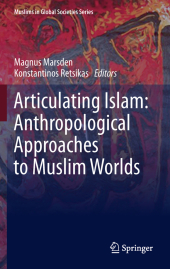 Neuerscheinungen 2014Stand: 2020-02-01 |
Schnellsuche
ISBN/Stichwort/Autor
|
Herderstraße 10
10625 Berlin
Tel.: 030 315 714 16
Fax 030 315 714 14
info@buchspektrum.de |

Magnus Marsden, Konstantinos Retsikas
(Beteiligte)
Articulating Islam: Anthropological Approaches to Muslim Worlds
Herausgegeben von Marsden, Magnus; Retsikas, Konstantinos
2013. 2014. viii, 268 S. 17 SW-Abb.,. 235 mm
Verlag/Jahr: SPRINGER NETHERLANDS; SPRINGER 2014
ISBN: 9400795971 (9400795971)
Neue ISBN: 978-9400795976 (9789400795976)
Preis und Lieferzeit: Bitte klicken
This book applies the methods and techniques of anthropology to analyze the role of Islam in the social lives of Muslims. Tracks and assesses key developments of the last three decades, and discusses the place of Islam in the anthropology of world religions.
This collection of arresting and innovative chapters applies the techniques of anthropology in analyzing the role played by Islam in the social lives of the world´s Muslims. The volume begins with an introduction that sets out a powerful case for a fresh approach to this kind of research, exhorting anthropologists to pause and reflect on when Islam is, and is not, a central feature of their informants´ life-worlds and identities. The chapters that follow are written by scholars with long-term, specialist research experience in Muslim societies ranging from Kenya to Pakistan and from Yemen to China: thus they explore and compare Islam´s social significance in a variety of settings that are not confined to the Middle East or South Asia alone. The authors assess how helpful current anthropological research is in shedding light on Islam´s relationship to contemporary societies. Collectively, the contributors deploy both theoretical and ethnographic analysis of key developments in the anthropology of Islam over the last 30 years, even as they extrapolate their findings to address wider debates over the anthropology of world religions more generally. Crucially, they also tackle the thorny question of how, in the current political context, anthropologists might continue conducting sensitive and nuanced work with Muslim communities. Finally, an afterword by a scholar of Christianity explores the conceptual parallels between the book´s key themes and the anthropology of world religions in a broader context. This volume has key contemporary relevance: for example, its conclusions on the fluidity of people´s relations with Islam will provide an important counterpoint to many commonly held assumptions about the incontestability of Islam in the public sphere.
Introduction.- Magnus Marsden & Konstantinos Retsikas.- Shurafâ as cosmopolitans: Islam, genealogy and hierarchy in the Central Sahara Judith Scheele.- Death and the spirit of patriarchy in western India Edward Simpson.- . On the skills to navigate the world, and religion, for coastal Muslims in Kenya Kai Kresse.- Beyond Islam: tradition and the intelligibility of experience J ohan Rasanayagam.- Becoming sacred: humanity and divinity in East Java, Indonesia Konstantinos Retsikas.- Self-similarity and its perils Gabriele vom Bruck.- The universal and the particular in rural Xinjiang: ritual commensality and the mosque community Chris Hann.- Apolitical "Islamisation"? On the limits of religiosity in montane Morocco Matthew Carey.- Integrity and commitment in the anthropology of Islam Morgan Clarke.- Fieldwork in Pakistan and Afghanistan compared Magnus Marsden.- 11.Afterword: De-exceptionalising Islam Simon Coleman.
From the reviews:
"The papers are written in the frame of the debate about what constitutes an anthropology of Islam, and appropriately, respond with and from ethnographic work. ... With its range of geographical contexts and authorial perspectives, it is a valuable contribution to thinking within the anthropology of Islam. ... it raises issues that will help our understanding of other religions and of humanity." (Moyra Dale, Aseasuk News, Issue 54, 2013)


